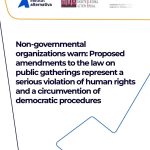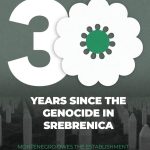
NON-GOVERNMENTAL ORGANIZATIONS WARN: PROPOSED AMENDMENTS TO THE LAW ON PUBLIC GATHERINGS REPRESENT A SERIOUS VIOLATION OF HUMAN RIGHTS AND A CIRCUMVENTION OF DEMOCRATIC PROCEDURES
02/07/2025
SREBRENICA BETWEEN RESPONSIBLE REMEMBRANCE AND TARGETED DENIAL
06/07/2025MONTENEGRO TO ESTABLISH A REMEMBRANCE DAY FOR THE VICTIMS OF THE SREBRENICA GENOCIDE

On the occasion of the upcoming 30th marking of the Srebrenica genocide, Human Rights Action (HRA), Centre for Civic Education (CCE), and Centre for Peace and Women’s Education – ANIMA call on the Parliament and Government of Montenegro to urgently establish 11 July as the official Remembrance Day for the victims of the Srebrenica genocide, and to organize its commemoration already this year in a dignified manner, in line with the 2024 United Nations (UN) General Assembly Resolution, which Montenegro supported last year, as well as the 2021 Resolution of the Parliament of Montenegro.
Since 2021, we have demanded every year that Montenegro officially establish 11 July as the Remembrance Day. Last year, during the commemoration of the 29 years of the Srebrenica genocide, this initiative was supported by 76 non-governmental organizations from Montenegro.
We remind the public that members of the Army of the Republika Srpska (VRS) systematically killed more than eight thousand unarmed Bosniaks aged 14 to 70 between 11 and 19 July 1995. More than six hundred children were also murdered, the youngest of whom was a baby born on 13 July 1995, exhumed from a mass grave near Srebrenica in 2012. The genocide in Srebrenica represents the largest crime committed on European soil since World War II. This crime has been established by verdicts of the International Criminal Tribunal for the former Yugoslavia (ICTY) and the International Court of Justice (ICJ). National courts in Bosnia and Herzegovina, Serbia, Croatia, Germany, Austria, Switzerland, and the Netherlands have also confirmed that members of the VRS and special units of the Republic of Serbia (“Scorpions”) committed genocide and other war crimes in Srebrenica.
The ICTY and the International Residual Mechanism have convicted 21 individuals for crimes committed in Srebrenica, including seven of them for the crime of genocide, based on more than 1,500 witness testimonies and around 28,000 pieces of evidence. In Bosnia and Herzegovina, 31 individuals have been convicted for the same crimes, including 14 for genocide; in Serbia, five; and in Croatia, two.
The Parliament of Montenegro adopted a Resolution on the Srebrenica Genocide on 17 June 2021, recognizing the genocide committed in July 1995 and committing to its condemnation and the nurturing of a culture of remembrance. According to the UN General Assembly Resolution of 2024, Montenegro is obliged to officially commemorate 11 July this year as the Day of Remembrance for the Victims of the Genocide in Srebrenica. Article 1 of the UN General Assembly Resolution designates 11 July as the International Day of Reflection and Commemoration of the 1995 Genocide in Srebrenica, to be observed annually. Article 1, paragraph 5 of the Montenegrin Parliament Resolution emphasizes the importance of declaring July 11th as the Day of Remembrance for the Victims of the Genocide in Srebrenica.
We are witnessing numerous examples of institutional lack of awareness and sensitivity regarding the culture of remembrance. These reflect a systemic failure to properly confront the past. Despite formal acts and declarative commitments made by decision-makers, strong narratives denying or relativizing the genocide in Srebrenica persist in Montenegrin society without an adequate institutional response. Findings from a CCE survey conducted in January 2025 show that a significant portion of Montenegrin citizens deny that genocide occurred in Srebrenica – nearly one in five respondents (18.5%), while 16.5% remain undecided on the matter. A 2024 CCE study of the youth population revealed similar findings: around 15% of young people deny the genocide in Srebrenica, and 18.4% either do not know or refuse to answer questions about it. This points to serious deficiencies in public awareness, as well as challenges in fostering a culture of remembrance and confronting the past, which are further undermined by regressive narratives.
Genocide denial or minimizing its gravity is not only illegal but also an insult to the dignity of victims and their families, and a direct threat to peace and stability in the region. A culture of remembrance and a clear distancing of the state from war crimes, including genocide, form the foundation of a responsible society based on the rule of law, truth, and respect for human rights.
We emphasize that Montenegrin institutions have a responsibility to mark this important anniversary in a dignified manner, in accordance with international standards and their own resolutions, to honour the victims of the Srebrenica genocide and provide support and recognition to the survivors.
We call on the authorities to:
- urgently initiate the procedure to officially declare 11 July as the Remembrance Day for the Genocide in Srebrenica and place this issue on the agenda of Parliament;
- take all necessary steps this year to officially mark 11 July as the Remembrance Day for the Victims of the Genocide in Srebrenica, thus demonstrating Montenegro’s commitment to its proclaimed values and international obligations;
- publish a programme for the 2025 commemoration in accordance with international standards and domestic obligations.
This year, Montenegro must demonstrate its commitment to its principles and international obligations and its readiness to face the past in a dignified and responsible way. Officially declaring 11 July as the Remembrance Day for the Victims of the Genocide in Srebrenica, and institutionalizing its commemoration, would send a clear message of commitment to truth, justice, and a culture of remembrance. It would also be an important measure against denial of this crime, contributing to educating younger generations about the dangers of hatred, nationalism, and war crimes, and ensuring lasting peace in the region.
Human Rights Action (HRA)
Centre for Women’s and Peace Education – ANIMA
Centre for Civic Education (CCE)






 English
English Montenegrin
Montenegrin